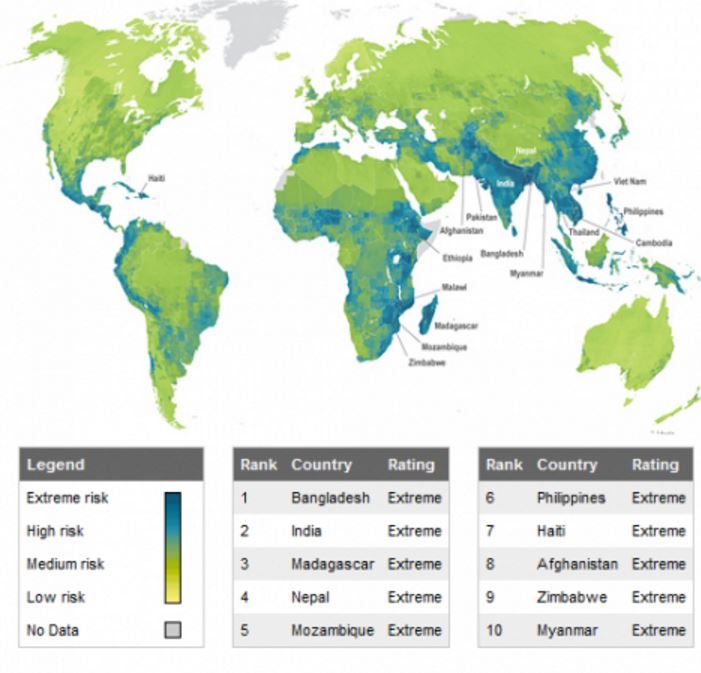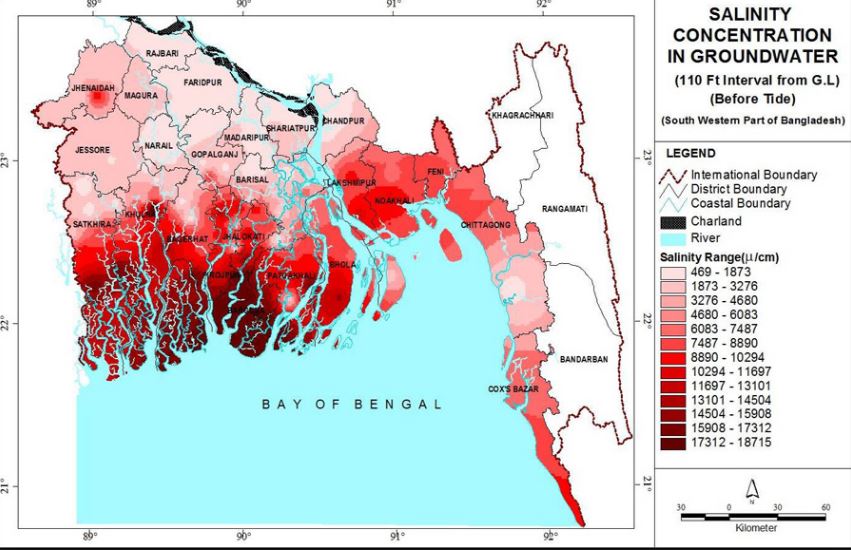Stress-Tolerant Rice: Securing Bangladeshi Livelihoods from Consequences of Climate Change

Climate change has caused an onslaught of cyclones and flash floods and Bangladesh, and the development of stress-tolerant rice is one adaptation the country can implement to protect millions of livelihoods.
My parents’ homeland—Bangladesh—sadly ranks first as the country most vulnerable to climate change.[1] In fact, the World Bank asserts that if climate change continues on its current path, by the 2050s, 40% of Bangladesh’s land will be submerged.[2] Situated north of the Bay of Bengal, Bangladesh has already been experiencing irregular monsoons, salinity intrusion, intense cyclones and flash flooding—all of which will only become more severe and threatening to agriculture as climate change continues. Agriculture is Bangladesh’s most important sector, contributing 12% to GDP and employing nearly half of Bangladesh’s workforce.[3]

As the backbone of the country, the agriculture sector must become more resilient in the face of climate change challenges or else food security and livelihoods will be in serious jeopardy. The Bangladesh Rice Research Institute (BRRI) plays a critical role in this endeavor. With rice as the country’s staple food and source of income, the country has much to lose from unproductive and damaged rice fields.[4]
BRRI was established in 1970 to develop and disseminate high-yielding rice varieties and rice production technologies to rural farmers at a low cost.[5] BRRI’s role, though, has recently changed as rice fields are being destroyed by volatile weather brought on by climate change. BRRI is now focused on using its research to create stress-tolerant rice varieties that can withstand the excess water exposure and salinity intrusion brought by climate change.[6]

What is BRRI doing to adapt to the effects of climate change?
- Developing Salt-Tolerant Rice Varieties: BRRI has developed seven strains of salt-tolerant rice varieties using gene-marker technology to adjust to the higher salinity brought on from the increase in cyclones and flash floods, but BRRI will need to develop more due to the large variability in salinity conditions across the country.[7]
- Developing Short-Duration Rice Varieties: BRRI has also helped develop rice varieties that can withstand submergence during flash floods, which have historically devastated rice fields.[8]
- Developing Other Stress-Tolerant Crops: BRRI is also working closely with the Bangladesh Agriculture Research Institute to share their knowledge to develop heat tolerant wheat and tomato varieties in potential cases of drought in certain areas of the country.
- Partnering with Bangladesh Government: BRRI has been collaborating closely with the Department of Agriculture Extension to distribute these stress-tolerant rice varieties to farmers in the southern coastal region, which has been more prone to high salinity.[9]
These efforts by BRRI have been truly incredible for the future of Bangladesh’s food security and the livelihoods dependent on rice agriculture, in light of its vulnerability to climate change. However, development of stress-tolerant crops is not enough—coordination with other stakeholders and educating farmers on effective implementation is necessary. The BRRI can do the following to ensure this happens:
- Increase Agricultural Extension Services to Farmers: BRRI should work with other Bangladesh agencies to educate rural farmers on the need to use stress-tolerant rice and crop varieties; this may be a problem given the lack of education of many rural farmers.
- Utilize Precision Agriculture Technologies for Fertilization Assessment: Another issue BRRI may face is how rural farmers will know when to use stress-tolerant varieties. To address this, BRRI should identify low cost remote sensor technologies that can easily be implemented and used by farmers to assess their soil conditions.
- Share Crop Technologies and Knowledge Globally: There are a number of private sector agribusinesses and international organizations that are working to develop and disseminate stress-tolerant crops around the world, and BRRI can work with these institutions to develop and share knowledge about new stress-tolerant crop varieties.
- Encourage Financial Adaptation: For BRRI’s research to be implemented and effective, the government must focus on financial adaptation. BRRI could encourage the government to start accumulating contingent reserves that will provide subsidies to farmers that are affected by flash floods. These reserves will subsidize diesel fuel used for irrigation, fertilizer costs and remote sensor technologies.
Word Count: 641
[1] National Geographic, “Bangladesh, India at Risk from Climate Change,” http://voices.nationalgeographic.com/2010/10/20/bangladesh_india_at_risk_from_climate_change, accessed November 2016.
[2] The World Bank, “Warming Climate to Hit Bangladesh Hard with Sea Level Rise, More Floods and Cyclones,” http://www.worldbank.org/en/news/press-release/2013/06/19/warming-climate-to-hit-bangladesh-hard-with-sea-level-rise-more-floods-and-cyclones-world-bank-report-says, accessed November 2016.
[3] International Finance Corporation, “Adapting to Climate Change in Bangladesh: Stress Tolerant Seeds for Stress-Prone Regions,” http://smartlessons.ifc.org/smartlessons/lesson.html?id=1254, accessed November 2016.
[4] Ricepedia, “Bangladesh,” http://ricepedia.org/Bangladesh, accessed November 2016.
[5] Nagothu, Udaya. Food Security and Development: Country Case Studies. New York, NY: Routledge, 2015.
[6] Ministry of Environment and Forest, Government of the People’s Republic of Bangladesh. Climate Change and Agriculture in Bangladesh, 2009.
[7] International Finance Corporation, “A Strategy to Engage the Private Sector in Climate Change Adaptation in Bangladesh,” https://cmsdata.iucn.org/downloads/agriculture.pdf, accessed November 2016.
[8] Partnerships for Enhanced Engagement in Research Science, “Validation of salt tolerance determinants in rice,” ites.nationalacademies.org/PGA/PEER/PEERscience/PGA_084034, accessed November 2016.
[9] International Finance Corporation, “A Strategy to Engage the Private Sector in Climate Change Adaptation in Bangladesh,” https://cmsdata.iucn.org/downloads/agriculture.pdf, accessed November 2016.



Thanks for this article, Farha – it is great to see an organization making a concrete impact in the face of climate change on an issue that deeply affects the populations well-being. It seems like these new stress-tolerant rice varieties have the potential to dramatically improve yields as extreme climate events continue to increase. I look forward to seeing the effectiveness and dissemination of these improved varieties.
I did a bit more reading about BRRI online to try and understand how the organization is funded, and I struggled to find that information. While I agree with the suggestions you offer for the BRRI around implementation, I wonder how resource constrained this agency is and how realistic they are. I do not know a ton about the dynamic between agencies like this and the government in Bangladesh. It seems like if they were able to partner closely with the government (the 4th idea you propose), they could not only push for financial adaptation initiatives, but also leverage the government to educate rural farmers on these new varieties (2nd idea) and share these new technologies globally (3rd idea).
The IRRI, which the BRRI used to model their research after, is very explicit about their funding sources and their ties various governments[1]. Government donations accounted for 30% of their budget in 2014. The BRRI could also consider partnering with the IRRI in some capacity, especially in regards to your 3rd proposed idea, working to share their technologies globally.
Source: http://irri.org/about-us/our-funding
Farha, thanks for a super interesting post! As a native to this region whose primary carbohydrate is rice, this (literally) hits close to home. I like your suggestions for BRRI, especially your suggestion on financial adaptation, as I believe the biggest barrier to implementing this program will be the financial constraints of the farmers. I would push this further and suggest that BRRI give the farmers an incentive (monetary or otherwise) to test out the new varieties of rice. One way of encouraging farmers could be to guarantee a minimum purchase ( BRRI can do this either directly or facilitate it through rice buyers).
Rice farming has direct adverse impact on global warming. Flooded rice fields emit methane, that is second in importance only to carbon dioxide as a greenhouse gas.[1] Additionally, slash and burn agricultural practices are still rampant in Bangladesh, which reduces forest cover, contributing to global warming as well as increasing malaria risk for the farmers.[2] BRRI can also work to develop hybrids that would emit lower methane. Further, the government has a key role here as well — tighter regulations around deforestation should be put in place immediately as deforestation isn’t just a long-term climate change contributor, but for a low-lying country like Bangladesh it can have a (relatively) short-term impact in further degrading soil and exacerbating effects of floods.
1. http://www.fao.org/fileadmin/templates/agphome/documents/Rice/rice_fact_sheet.pdf
2.http://www.scidev.net/south-asia/health/news/malaria-stalks-bangladesh-s-slash-and-burn-farmers.html
Thank you for this post – I had no idea the BRRI existed, but can see why it is critical that it does!
The work BRRI has done appears to be on the forefront of this issue. In line with your recommendations, I question how much of their R&D has translated into actual crops. I specifically like your 3rd idea of the BRRI sharing their information globally so that other regions may adopt some of these ideas. The more others are willing to test out some of the BRRI’s technologies, the more likely it may be that BRRI can get stakeholders in Bangladesh on board.
They truly seem to be the pioneers in this area and should receive recognition as such. I think it could go a long way to helping them see some of their ideas play out in practice.
Thank you for your post, Farha! It was a very well-written and detailed assessment about the valuable work being undertaken by BRRI. Considering the dependency of Bangladesh and many other countries on agriculture as a primary source of livelihood, any steps taken to combat the adverse effects and repercussion of climatic changes and global warming is welcome and much needed. Agriculture is commonly perceived as a green economy, often overlooked as a contributor to the issue of global warming itself. I think that BRRI along with the activities it currently undertakes (strengthening the rice crop itself for weathering the harsh climate brought about by global warming), should also probably focus on the fact that rice paddies themselves are a contributor to Green House Gas emissions, primarily methane.[1] Certain agricultural practices can be incorporated to lower these emissions.
1. https://www.sciencedaily.com/releases/2012/10/121021154455.htm